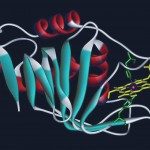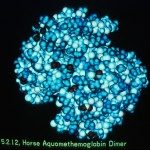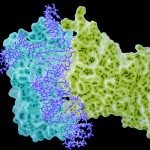Lien vers Pubmed [PMID] – 25158884
Lien DOI – 10.1111/febs.13024
FEBS J 2014 Nov; 281(21): 4852-65
The human protein tyrosine phosphatase non-receptor type 4 (PTPN4) prevents cells death. Targeting its PDZ domain abrogates this protection and triggers apoptosis. We demonstrate here that the PDZ domain inhibits the phosphatase activity of PTPN4. The mere binding of a PDZ ligand is sufficient to release the catalytic inhibition. We combined analytical ultracentrifugation, small angle X-ray scattering and NMR to understand how the PDZ domain controls PTPN4 activity. We show that the physiologically active PTPN4 two-domain, encompassing the PDZ and the phosphatase domains, adopts a predominant compact conformation in solution. The PDZ ligand binding restores the catalytic competence of PTPN4 disrupting the transient interdomain communication. This study strengthens the emerging notion that PDZ domains can act as regulators of enzyme activity and therefore are active players in the dynamic regulation of signaling pathways.








